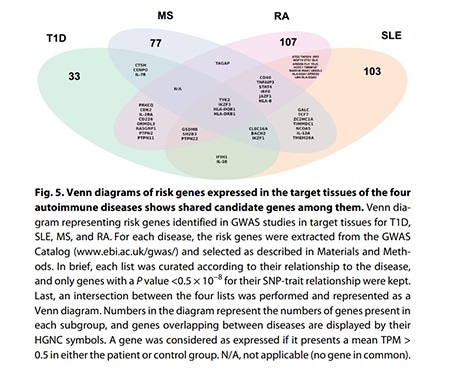According to a research team, headed by Decio L. Eizirik, MD, Ph.D., a Scientific Director from the Indiana Biosciences Research Institute Diabetes Center, new treatments for autoimmune disorders can be identified by studying both target tissues and the immune system together.

Image Credit: Indiana Biosciences Research Institute.
This study titled, “Gene expression signatures of target tissues in type 1 diabetes, lupus erythematosus, multiple sclerosis and rheumatoid arthritis,” has been featured in the January 6th, 2021, edition of the Science Advances journal.
We must move away from the present “immune-centric-only” view of autoimmune diseases. Indeed, trying to understand these diseases focusing on the immune system only, and forgetting the target tissues, may be similar to attempting to fly a plane with only one wing.”
Decio L. Eizirik, MD, Ph.D., Scientific Director, Indiana Biosciences Research Institute Diabetes Center
Autoimmune disorders, which impact up to 5% of the population in different areas, tend to suffer from a case of mistaken identity. The immune system is expected to protect people from tumors or infectious diseases.
However, in the case of autoimmune disorders, the immune system mistakenly attacks and kills the body components, which later leads to, for instance, systemic lupus erythematosus (SLE), type 1 diabetes (T1D), rheumatoid arthritis (RA), or multiple sclerosis (MS).
All the four autoimmune disorders share nearly 50% of the same genetic risks, mechanisms, and chronic local inflammation, causing damage to the target tissues.
In spite of these common traits, autoimmune diseases are generally examined separately and with a focus on the immune system instead of the target tissues. Knowing that there is a rising proof that the target tissues of such diseases are not guiltless bystanders of the immune system attack, but are rather active participants, Eizirik and his group proposed that major inflammation-induced mechanisms, possibly shared between SLE, T1D, RA, and MS may fuel analogous molecular signatures at the target tissue level.
This research is significant in reaching the JDRF’s mission to cure, treat and prevent T1D... Discovering the common pathways of tissue destruction across multiple autoimmune diseases will dramatically accelerate our path to a cure for T1D.”
Frank Martin, Ph.D., Director of Research, JDRF
Martin added, “Drugs that are effective in one autoimmune disease could be equally beneficial for another and quickly repurposed to make a big impact for people living with that disease. Characterizing the similarities and differences between multiple autoimmune diseases has the potential to transform the way we treat and cure these diseases in the future.”
To test this theory, the team collected gene expression data from diseased tissue sampled from individuals or controls impacted by SLE, T1D, RA, and MS. This denoted significant common gene expression changes at the target tissues of the four autoimmune disorders assessed. TYK2, a type of protein, is a common candidate gene between these four diseases. This protein controls interferon signaling.
The researchers demonstrated in the study that the use of TYK2 inhibitors, which are already being used for other autoimmune disorders, protects β-cells from immune-mediated damage. This discovery strengthens the significance of examining the target tissue of autoimmune disorders in dialog with the immune system, to further interpret the natural history and genetics of these devastating disorders, and to find new treatments.
Source:
Journal reference:
Szymczak, F., et al. (2021) Gene expression signatures of target tissues in type 1 diabetes, lupus erythematosus, multiple sclerosis, and rheumatoid arthritis. Sciences Advances. doi.org/10.1126/sciadv.abd7600.